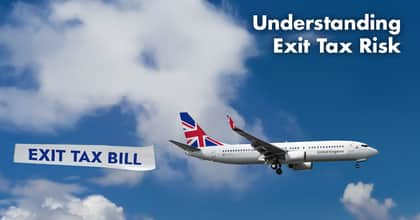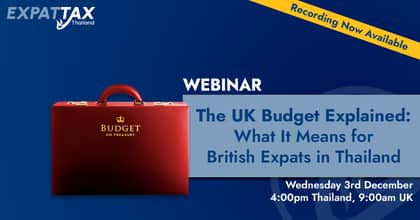Imagine rushing to meet the April 8th tax deadline only to realise you’re missing critical documents or misunderstand your obligations. With recent changes to Thailand’s tax rules, many expats are filing a Thai tax return for the first time. For Thai tax residents—those spending 180 days or more in the country—foreign income remitted into Thailand during the same year it is earned is now taxable. While this may seem daunting, getting organised early can transform the process into a smooth and stress-free experience.
With just over 80 days left until the filing deadline, the time to act is now. Proactive preparation ensures compliance, reduces stress, and gives you the opportunity to maximise savings. Not sure if you need to file? Use our interactive tool to find out in minutes: Do You Need to File a Thai Tax Return in 2025? Click here to get started.
In this article, we’ll explore the key reasons why acting now is critical and how it can save you time, money, and unnecessary hassle.
Reason 1: Avoid Last-Minute Stress and Mistakes
Filing taxes for the first time as an expat can feel overwhelming, especially under new regulations. Leaving it until the last minute increases the risk of rushing, often leading to costly mistakes.
When pressed for time, it’s easy to:
- Overlook key steps, such as gathering all required documents.
- Miscalculate figures or misunderstand tax rules.
- File an incomplete or inaccurate return, triggering penalties or delays.
Starting early lets you approach the process methodically. You’ll have the time to understand your obligations, resolve missing paperwork, and double-check your calculations. By acting now, you can reduce stress and avoid last-minute scrambles that make the process more overwhelming than it needs to be.
Reason 2: Ensure Compliance with New Rules
Thailand’s updated tax regulations mean foreign income remitted to Thailand during the year it is earned is now taxable. Understanding these rules is crucial to avoid penalties and ensure your filing is accurate.
For expats, the complexities of foreign income taxation often involve:
- Understanding Assessable Income: Not all sources of income are assessable for tax in Thailand. Make sure you understand the rules to optimise your tax outcomes.
- Double Tax Agreements (DTAs): Ensuring taxes paid abroad are credited properly in Thailand.
- Cross-Border Income Reporting: Knowing how to declare foreign income to avoid double taxation.
Misinterpreting these rules can lead to errors, fines, or additional scrutiny. Starting now ensures you have time to understand how these changes apply to you and to seek advice if needed. Early action not only guarantees compliance but also prevents unexpected financial surprises.
Reason 3: Collect and Verify Essential Documents
Gathering the right documents can be one of the most time-consuming parts of tax preparation. For expats, this may involve unique challenges, such as obtaining:
- Proof of Income: Pension statements, pay slips, or invoices showing earnings.
- Proof of Source of Funds: Documentation verifying the origin of remitted income.
- Proof of Tax Paid Abroad: Tax returns or payment receipts required under DTAs.
- Bank Statements: Evidence of financial transactions relevant to your tax return.
Documents from overseas institutions may take weeks to secure, and some may require translations into Thai or English. By starting early, you’ll have time to resolve missing paperwork, arrange translations, and ensure everything is in order before filing.
Reason 4: Maximise Tax Savings Opportunities
Getting organised early gives you the time to explore all possible tax savings opportunities. Many expats miss out on deductions, allowances, or credits because they rush through the filing process.
Common Tax-Saving Opportunities for Expats
- Deductions: Certain expenses, such as education or healthcare costs, may qualify.
- Allowances: If documented correctly, personal or dependent allowances can significantly reduce taxable income. You can learn more about deductions and allowances here.
- Foreign Tax Credits: Many expats can claim credits under DTAs to avoid double taxation.
Early preparation allows you to research these benefits, gather supporting documents, and consult with a professional to optimise your filing. Waiting too long may mean leaving valuable savings untapped.
Reason 5: Secure Professional Guidance Before It’s Too Late
Navigating Thailand’s tax system can be challenging, especially for first-time filers. Professional guidance can simplify the process, but tax advisors are in high demand as the deadline approaches.
Why Booking Early Matters
- Guaranteed Support: Our team works on a first-come, first-served basis, and schedules fill up fast.
- Strategic Planning: Early consultations allow advisors to tailor their advice to your specific needs.
- Peace of Mind: Knowing your taxes are in expert hands reduces stress and ensures accuracy.
Don’t wait until it’s too late to secure professional help. Early action ensures you’ll have access to the guidance you need to file confidently and on time.
Take the First Step Today
Filing your Thai tax return doesn’t have to be overwhelming. By getting organised now, you’ll enjoy peace of mind, ensure compliance, and unlock potential savings.
How Expat Tax Can Help
We’re here to make your tax filing process as smooth and straightforward as possible. Take the first step today by:
- Using Our Interactive Tool: Not sure if you need to file? Click here to find out in just a few minutes.
- Joining a Weekly Q&A Webinar: Ask your questions live and get guidance from our experts. Register for our next webinar.
- Booking a Free 15-minute Consultation: Speak with a member of our team to discuss your unique situation. Book your call here.
- Using Our Online Tax Filing Service: Streamline your filing with our secure, easy-to-use platform. Let our team handle the complexities while you focus on what matters most. Learn more about our stress free tax filing service here.
The clock is ticking relentlessly toward the April 8th deadline. Whether you’re filing for the first time or navigating complex tax rules, we’re here to help you every step of the way.


